In the realm of music production, the selection of appropriate tools is paramount, and headphones are no exception. They play a vital role in shaping sound, influencing every aspect of the production process, from mixing to mastering.
This article examines the impact of headphones on sound quality and outlines the key factors to consider when selecting the ideal pair to meet one’s requirements.
From studio-grade options to budget-friendly alternatives, we provide essential guidance for utilizing headphones effectively throughout the creative process.
Regardless of whether one is an experienced producer or just beginning their journey, acquiring the right headphones can significantly enhance the overall music-making experience.
Understanding the Importance of Headphones in Music Production
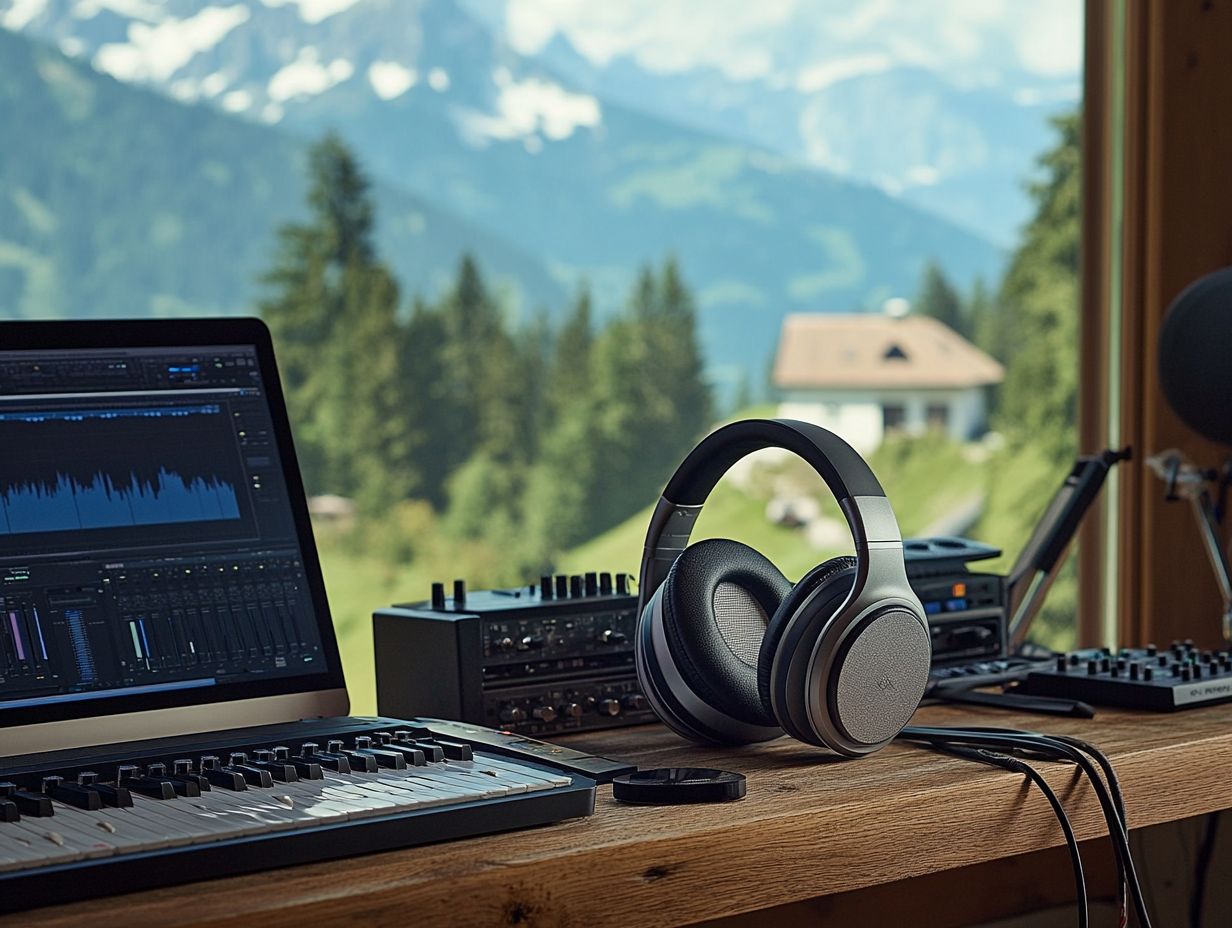
In the field of music production, headphones are essential for achieving the sound quality and audio fidelity that artists and producers seek.
Selecting the most suitable headphones for studio use can greatly enhance the listening experience, ensuring that every detail is captured during the recording, mixing, and mastering processes.
Studio headphones, in particular, offer distinct advantages by providing precise monitoring capabilities, enabling sound engineers to make critical decisions that affect the final product.
Recognizing the significance of headphones is crucial for anyone involved in music production, as they play a pivotal role in influencing overall sound reproduction, frequency response, and acoustic transparency of the music being created.
How Headphones Affect Sound Quality
The sound quality of headphones is of utmost importance in music production, as it directly impacts how sound engineers perceive audio elements throughout the creative process. This significance cannot be overstated; headphones serve as the primary medium through which music is both experienced and evaluated.
When evaluating characteristics such as bass response and treble clarity, frequency response curves are crucial in determining the accuracy with which headphones reproduce the entire sound spectrum. Additionally, impedance levels are significant, as they influence how headphones interact with various audio sources, affecting both loudness and dynamic range.
The isolation performance of headphones plays a vital role in enabling engineers to concentrate on subtle nuances within tracks, free from external distractions, thereby facilitating a precise mixing environment. By considering these factors collectively, one can fully appreciate how headphones shape the overall audio experience.
Key Factors to Consider When Choosing Headphones for Music Production
Selecting the appropriate headphones for music production necessitates thorough consideration of multiple factors that influence both performance and user experience.
Professionals in this domain typically emphasize the importance of comfort and durability, recognizing that prolonged listening sessions are standard in audio work.
Furthermore, the price-performance ratio is essential, as it guarantees that users achieve optimal audio fidelity without incurring excessive costs.
Assessing headphone reviews and brand reputation can also assist users in identifying reliable options tailored to their specific requirements, whether for mixing, mastering, or critical listening.
Frequency Response and Sound Accuracy
Frequency response is a crucial factor in achieving sound accuracy in headphones, as it directly impacts the reproduction of music across various frequency ranges. A well-balanced frequency response ensures that all audio elements are clearly audible, from deep bass to crisp treble, thereby enabling sound engineers to attain optimal sound performance.
The dynamic range further contributes to this experience by allowing headphones to reproduce subtle nuances in audio, which is essential for professional-grade music production.
This consideration becomes particularly significant when evaluating different music genres. For example, bass-heavy genres such as hip-hop and electronic dance music benefit from headphones that emphasize low frequencies, providing a rich and immersive listening experience.
Conversely, classical music may require a more balanced response across the mid and high frequencies to accurately capture intricate harmonies and delicate instrumentation.
By comprehensively understanding how frequency response influences sound performance, listeners can make informed decisions that enhance their overall auditory enjoyment and appreciation of the music being played.
Comfort and Durability
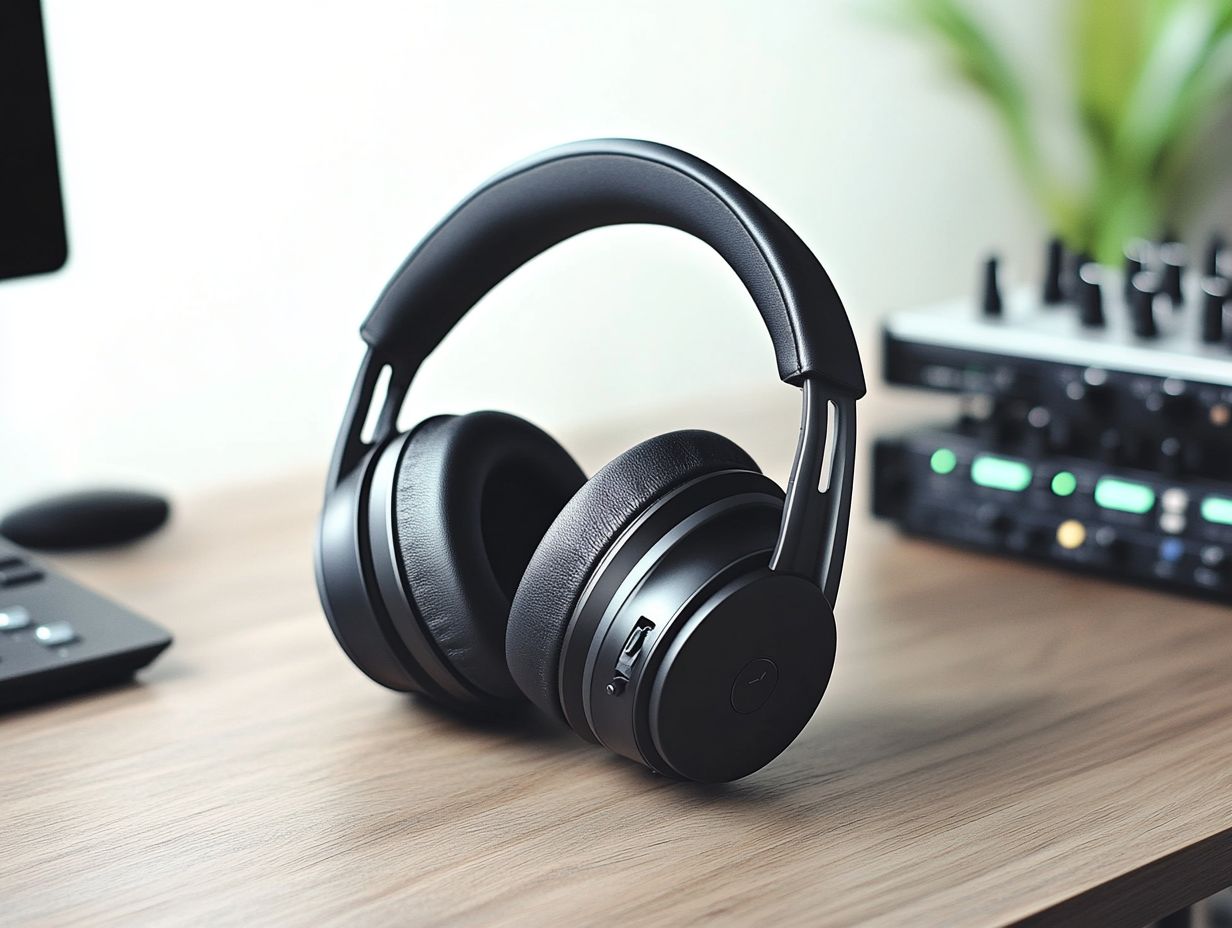
Comfort and durability are of utmost importance when selecting headphones for extensive music production tasks, as these factors directly influence the user experience during prolonged listening sessions.
High-quality ear padding and adjustable headbands are essential features that enhance comfort, allowing audio professionals to focus on their work without experiencing discomfort. Durability ensures that headphones can endure the demands of studio environments, establishing them as a reliable choice for producers and sound engineers alike.
Along with these attributes, the design of the ear cups plays a critical role in providing an optimal fit that promotes acoustic isolation and minimizes ambient noise interference, which is vital for precise mixing and editing.
The lightweight design of modern headphones also significantly contributes to comfort, as it reduces fatigue during extended use.
When headphones are constructed with robust materials that resist wear and tear, users benefit from enhanced longevity, thus making their investment worthwhile.
Ultimately, achieving the right balance between comfort and durability elevates the listening experience, enabling music creators to immerse themselves fully in their soundscapes.
Top Headphones for Music Production
Identifying the most suitable headphones for music production necessitates careful consideration of both audio quality and user preferences, as various models excel in different aspects.
The market presents a wide array of studio-grade headphones, equipped with advanced features that offer audio professionals superior sound reproduction and comfort.
User reviews and insights from industry experts serve as valuable resources for potential buyers, assisting them in making informed comparisons between brands and selecting headphones that meet their specific requirements for mixing, mastering, and critical listening.
Studio-Grade Headphones
Studio-grade headphones are essential tools for sound engineers and music producers, providing unparalleled sound accuracy and acoustic transparency that are crucial for critical listening. These professional headphones are meticulously designed to deliver exceptional noise isolation, enabling users to concentrate on the intricacies of their mix without external distractions.
Whether used for tracking or mixing, studio headphones offer the necessary sound fidelity to ensure that every detail is captured with precision.
Models from esteemed brands such as Audio-Technica, Beyerdynamic, and Sennheiser are particularly noted for their impressive sound signatures and superior build quality. For example, the Audio-Technica ATH-M50x is highly regarded for its robust bass response and clarity across the frequency spectrum, making it suitable for a diverse range of musical genres.
The Beyerdynamic DT 770 Pro features plush ear cushioning and remarkable passive noise isolation, which aids in maintaining focus during extended mixing sessions. Additionally, Sennheiser’s HD 600 series is recognized for its open-back design, which provides a natural soundstage that enhances spatial awareness.
Each of these options meets the high demands of professionals by combining innovative technology with exceptional craftsmanship, ultimately enhancing the studio experience.
Budget-Friendly Options
For individuals seeking high-quality sound at an affordable price, numerous budget-friendly headphone options are available in the market that deliver impressive performance. These headphones provide significant value, making them suitable for emerging sound engineers and music enthusiasts alike.
Despite being in a lower price range, many budget-friendly headphones still offer essential features, including commendable sound quality and portability, which render them suitable for various applications beyond music production.
When evaluating such options, models such as the Audio-Technica ATH-M40x and the Sony MDR-7506 are noteworthy for their exceptional sound fidelity and comfort during prolonged use. The price-performance ratio of these headphones is particularly commendable, allowing aspiring producers to monitor mixes accurately without sacrificing durability.
Moreover, the lightweight design of these models ensures that users can wear them for extended periods without discomfort, underscoring their practicality in demanding environments. These considerations contribute to making an informed decision for those on a budget while still achieving professional results.
Tips for Using Headphones in Music Production
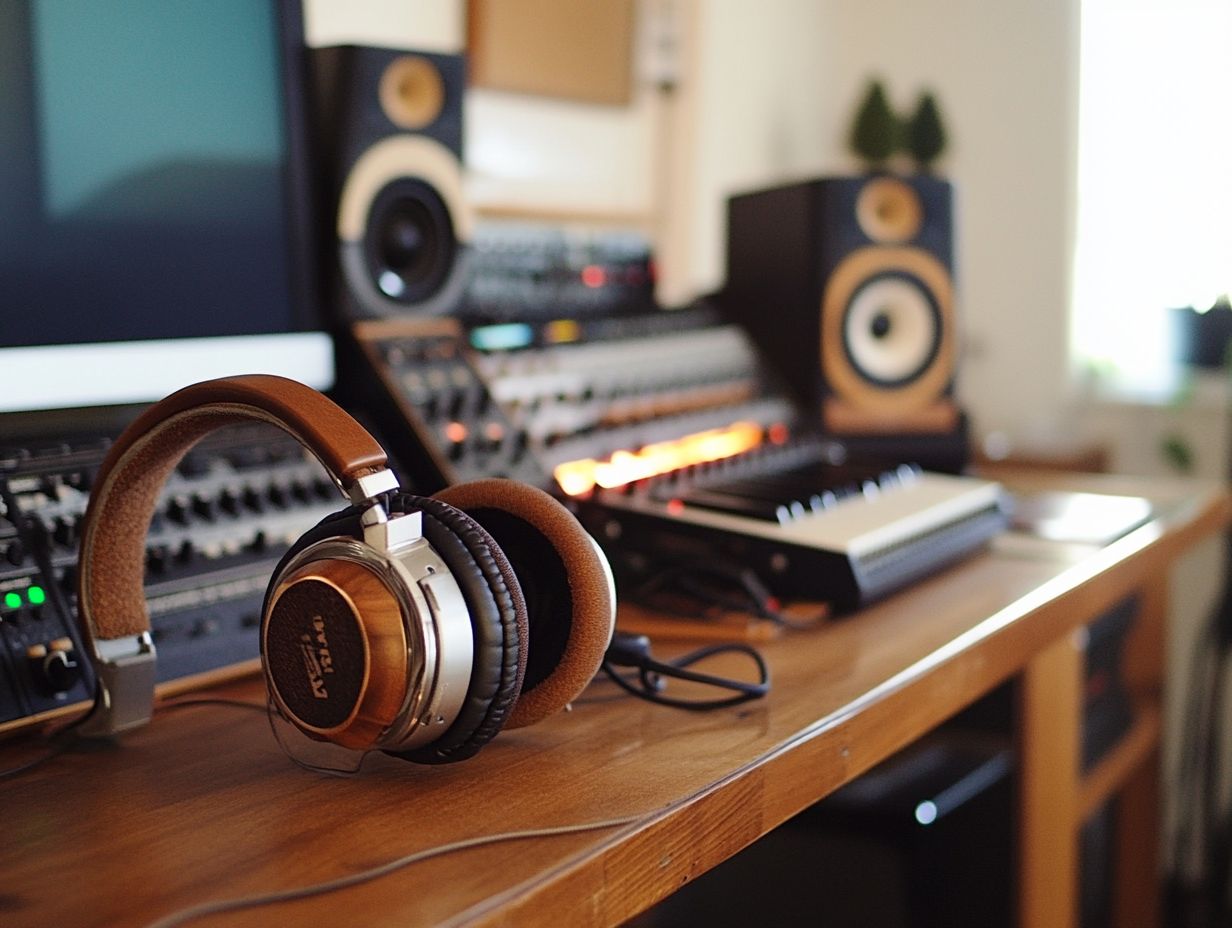
Utilizing headphones effectively in music production requires a comprehensive understanding of best practices that enhance the mixing process and refine critical listening skills.
By implementing specific techniques, audio professionals can optimize the advantages of their headphones, thereby ensuring that sound customization aligns with the intended artistic vision.
Additionally, incorporating headphone accessories such as headphone amplifiers and sound isolation pads can significantly enhance the listening experience, offering a more precise representation of the audio being produced.
Proper Usage and Care
Proper usage and maintenance of headphones are crucial for sustaining their performance and longevity. Adhering to best practices for upkeep, such as safely storing headphones and regularly cleaning the ear padding, can significantly extend their lifespan.
Features such as detachable cables can further enhance the overall durability of headphones, making them an advisable choice for professional environments.
Taking a few moments to store headphones in a protective case when not in use can prevent unnecessary wear and tear. Additionally, regularly wiping the exterior with a soft, dry cloth helps eliminate dust and grime that may accumulate over time.
It is equally important to be mindful of how headphones are handled; avoiding sharp bends in cables and excessive pulling can prevent internal damage. Users should also keep headphones away from extreme temperatures, as both heat and cold can adversely affect their performance and materials.
By incorporating these straightforward care techniques into daily routines, one can enjoy high-quality sound for years to come.
Utilizing Headphones in the Mixing Process
Utilizing headphones during the mixing process enables sound engineers to achieve a high level of audio fidelity and precision, which is essential for producing professional-grade music. By closely monitoring sounds through headphones, producers can identify subtle details that may be overlooked when utilizing studio monitors. This method allows sound engineers to make informed decisions regarding tonal balance, dynamic range, and overall mix clarity.
Headphones, particularly those designed for flat response, serve as essential tools that facilitate detailed listening for frequency discrepancies and spatial imaging. When employing isolation headphones, sound engineers can concentrate on nuances without the interference of external noise, thereby making it easier to fine-tune reverb and panning effects.
It is crucial to consider the headphone’s impedance and frequency response to ensure compatibility with audio interfaces and to achieve an accurate representation of the mix. Employing headphone monitoring while making critical adjustments enables creators to develop mixes that translate effectively across various listening environments, ultimately enhancing the final product.
Choosing the Right Headphones for Your Needs
Selecting the appropriate headphones for one’s needs requires a comprehensive understanding of personal preferences and the specific requirements associated with various music genres. Different headphones are designed to provide distinct listening experiences, and taking the time to read user reviews and assess brand reputations can significantly inform this decision.
Ultimately, identifying headphones that align with individual style will enhance both enjoyment and productivity in music production.
Preferences can differ substantially among users; for instance, some individuals may prioritize bass response, particularly for genres such as hip-hop, while others might seek clarity and detail in classical or acoustic music.
The intended use also plays a pivotal role in the selection process; casual listeners may prefer portable, lightweight models that are convenient for travel, whereas professionals often invest in studio-grade options that offer superior sound isolation.
Additionally, factors such as comfort, durability, and aesthetic appeal further influence the selection process. By thoughtfully considering these elements, individuals can ensure a tailored auditory experience that aligns with their lifestyles and deepens their connection to the music they cherish.
Frequently Asked Questions
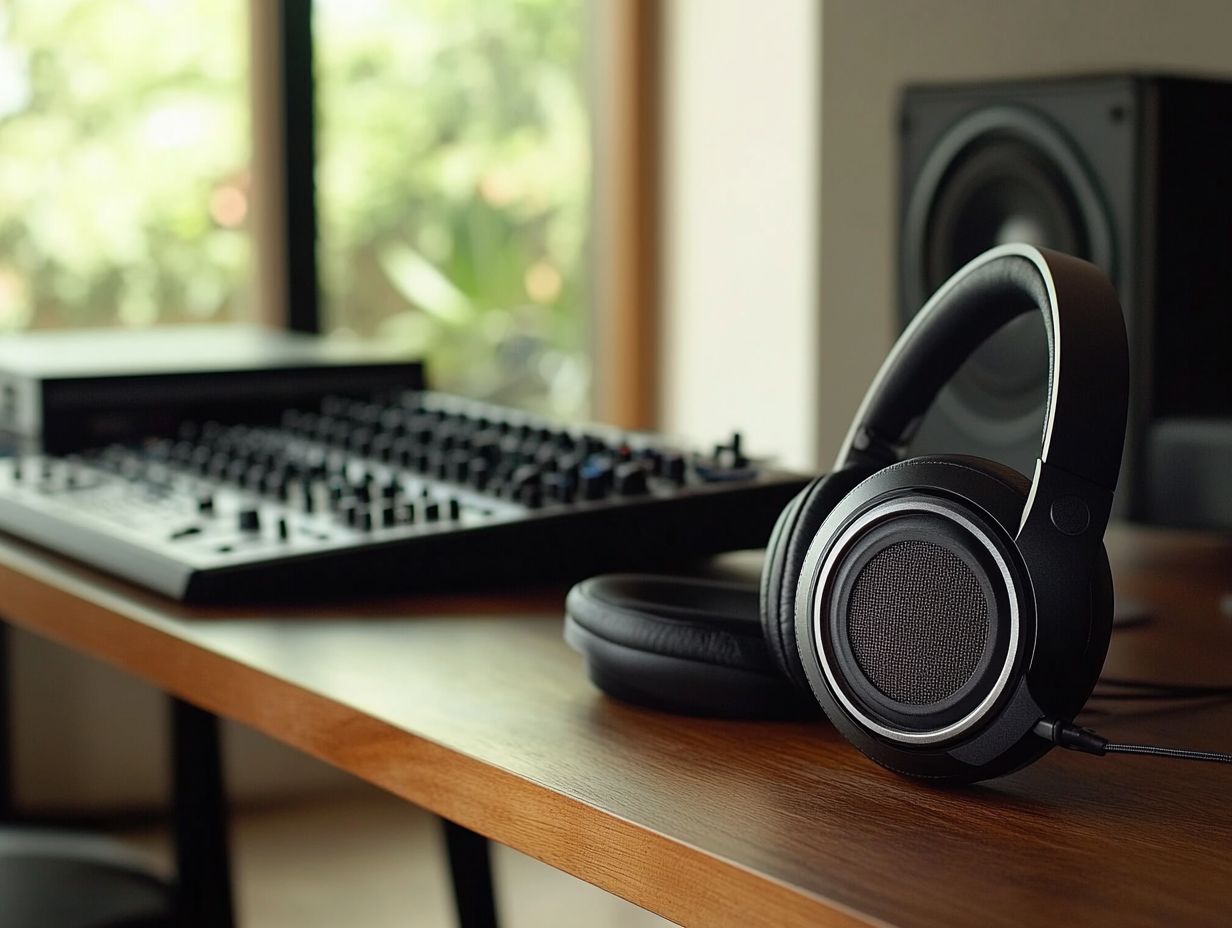
What are the best headphones for music production?
The best headphones for music production depend on personal preference and budget. Some popular options include the Sony MDR7506, Beyerdynamic DT 770 Pro, and Audio-Technica ATH-M50x.
What makes a good pair of headphones for music production?
A good pair of headphones for music production should have a flat frequency response, accurate sound reproduction, and comfortable fit for long listening sessions. Closed-back headphones are also recommended to minimize sound leakage.
Are there any affordable options for headphones for music production?
Yes, there are many budget-friendly options for headphones that are suitable for music production. Some options to consider are the Audio-Technica ATH-M20x, Sony MDR7506, and Sennheiser HD280PRO.
Can I use any headphones for music production?
While any headphones can technically be used for music production, it is recommended to use headphones specifically designed for this purpose. Regular consumer headphones may have boosted bass or treble, which can distort the sound and affect the mixing process.
What features should I look for when purchasing headphones for music production?
Some important features to consider when purchasing headphones for music production are the frequency response, impedance, and sensitivity. It is also important to consider the type (open-back or closed-back), comfort, and durability of the headphones.
Can I use wireless headphones for music production?
While wireless headphones may be convenient for everyday use, they are not recommended for music production due to potential latency issues and compressed audio quality. It is best to use wired headphones for accurate sound reproduction in the studio.

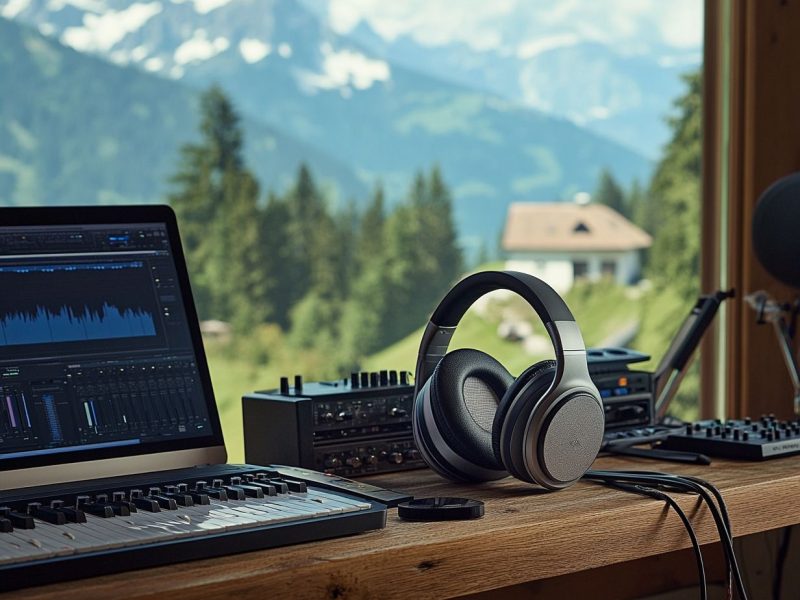
 The 8 Best 2.1 Speakers In India 2024 – Comparison & Review!
The 8 Best 2.1 Speakers In India 2024 – Comparison & Review!